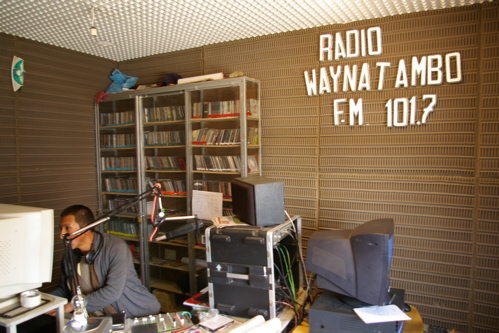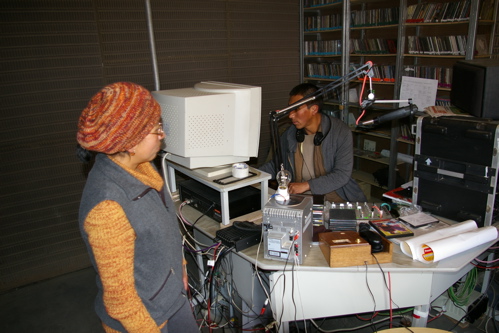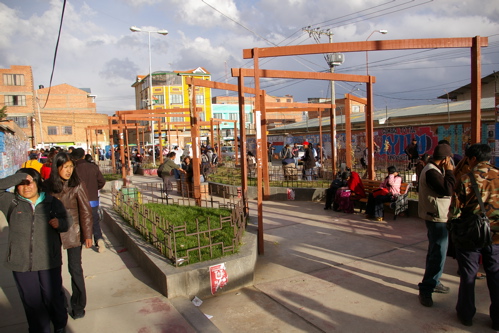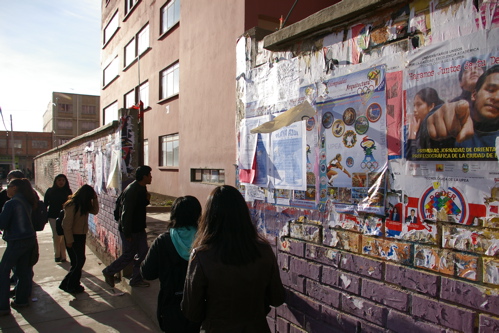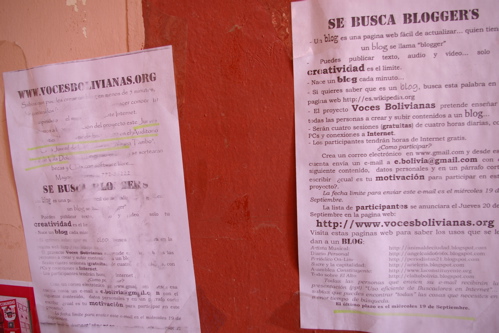What makes a participatory media project successful? Reviewing the original Rising Voices application, we wrote:
How will you measure and evaluate your project’s impact – on your main participants? other contributors? on the larger community? How many participants do you expect to be involved in your project? How will you seek and sustain their involvement? (200 words)
According to unofficial estimates the city of El Alto currently has 10 blogs, many of which are maintained by the same author. The main evaluative measure will be the number of blogs and blog entries that are created and maintained over the course of the two-month project. Follow-up after the project ends will be essential to ensure that the blogs continue, which will be encouraged through additional opportunities for internet access. For selected participants, the digital cameras and voice recorders will be awarded, which will be an incentive to produce high-quality work and making it easier to create content in the future.
Some of the participants will be encouraged to be part of future outreach programs and help continue to teach others about these tools.
Another evaluative measure will be participants’ attitudes towards these new technologies. A pre and post-test will be provided to measure the participants’ attitudes towards the ability to express themselves, as well as their comfort using internet tools.
This has been a topic of discussion internally, as well as some observers and supporters of the project. The Bolivian blog community site Blogs Bolivia took a look at the 23 new participants blogs and indicated which ones were still writing 3 months after the final workshop took place. They found that 25% of the blogs were still writing in the blog and observes:
Sadly we find that the majority of the (new bloggers) have stopped publishing between the months of October and November. This means that even though they learned the new technology, there are still reasons related to costs, interest, or habit, which caused them to stop writing. Or maybe the teaching methods have not found the right group.
The article goes onto say that when looking at it from a more optimistic viewpoint, one could say that there are six more blogs in El Alto that there were before. Since this is the first project of its kind in Bolivia, would some be happy with these results or would a perfectionist like me feel like we didn't do enough. I offered up these possible remedies for this number, with the hope that the numbers will increase after the second project in El Alto:
1) During the registration, we should find those with more of a commitment. There will always be people that love to blog and others that will say, ‘this is not for me.’ Maybe we can charge a small registration fee and if they complete all of the workshops, then they will be refunded in full. (This is a little complicated, because we want to ensure everything remains without cost.)
2.) More support during the week. If they are not writing, then there should be calls or text messages to see if they need help or additional personal help. The lines of communication have always been open for those with questions, but maybe this should be increased.
Is it simply a question of raw numbers, i.e. an increase in the number of sustainable blogs? We also sought to measure attitudes and acquisition of knowledge. A pre and post test was given to the participants to ask them about their knowledge regarding the use and familiarity of blogs. For the pilot project, on a scale of 1-5, we found that the participants felt that they increased their knowledge in the use of blogs from 1.5 to 2.6. In addition, we also asked them about their knowledge of the advantages of having a blog, i.e. their utility. This also increased from 3.0 to 4.1. This may not be entirely scientific, but it does show that these workshops do help in some way in regards to the participants’ knowledge and attitudes towards the use of blogs.
Nevertheless, it is still a learning process in seeing what works and what should be scrapped altogether. Some things cannot be measured, but can simply be observed, such as when Bolivianas, who had no previous knowledge of these new tools, become excited to write and share their stories. It can also been seen in young people, who continue to share their traditions handed down from generation to generation, as well as write in their native language of Aymara.
It is still a work in progress, and hopefully the percentage of new bloggers that continue will begin to rise more and more.







